Muti, poised to lead CSO in Beethoven cycle, hears symphonies as nine cosmic questions
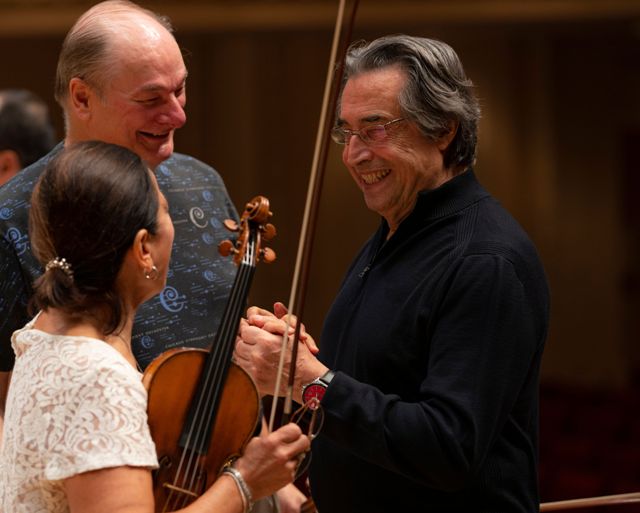
Music director Riccardo Muti chats with violinists Mihaela Ionescu and David Taylor at the onset of the Chicago Symphony Orchestra’s 2019-20 season. (CSO photos by Todd Rosenberg)
Interview: Music director says season-long project celebrates both the titanic composer and treasured years with Chicago musicians.
By Nancy Malitz
Fresh from Italy’s Ravenna Festival, where he conducts and teaches every summer, Riccardo Muti, music director of the Chicago Symphony Orchestra, is plunging into a season-long cycle through Beethoven’s symphonies in anticipation of the 250th anniversary of the composer’s birth in 1770.
The German composer’s enduring genius is being celebrated in special projects all over the world as his enormous impact on Western culture endures. Muti is scheduled to conduct all nine of Beethoven’s symphonies himself with the CSO throughout the season, generally in pairs, culminating next June with the massive stand-alone Ninth, known as the Choral Symphony because of the overpowering vocal throng in the magnificent summation, a grand Ode to Joy (“An die Freude”). He last performed it with the CSO at Orchestra Hall in 2014.
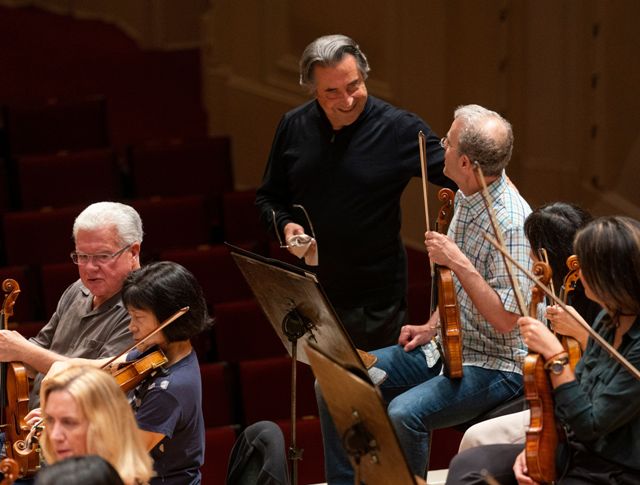
Muti says he wants the Beethoven cycle to be a document of his “ten years of wonderful relationship” with the CSO musicians.
Reached by telephone at his studio in Italy, where Muti underscored his thoughts at the piano, the maestro noted that he had done this entire project with the Philadelphia Orchestra, the Vienna Philharmonic, and several times with Milan’s La Scala Orchestra: “Now I want to do it with Chicago, because I have the idea that it will be a document of my admiration and love for the Chicago Symphony. It is not a testament from me – that would be too arrogant – but a document of our ten years of wonderful relationship.”
Muti’s contract with the orchestra ends after three more seasons, and although no one disputes that he is the best musician in the room when the elite musicians of the Chicago Symphony assemble, he strove repeatedly to make it clear that Beethoven sits above them all. Muti has long been a master at the art of describing great musical masterpieces in terms that anyone can understand, and as usual he spoke almost entirely without musical jargon, avoiding in particular the specialized technical terms that musicians routinely use among themselves to describe aspects of form, rhythm, harmonic structure and transition.
Instead. Muti dove straight into the humility that all musicians feel about Beethoven. Speaking of the Ninth Symphony, he echoed the reverence with which the great Italian conductor Arturo Toscanini often described the music of composer Giuseppe Verdi. “To find the truth, you have to be very, very humble. Only the person that feels in that moment inadequate – not good enough to reach the moral, ethical level of this music – only a person like this, and who also has the technical capabilities in hand, can create an acceptable interpretation.”
In talking about the first pair of symphonies that he will lead – Nos. 1 and 3 – on the Sept. 26-28 concerts, Muti went straightaway to the piano to demonstrate the creative leap made by the composer who arrived in classical Vienna, at age 21, in 1792 – the year after Mozart’s death, with Haydn still a living presence.
Beethoven cut the path into a startling new era. His First Symphony was heard in 1800, his Third in 1804, as Europe’s democratic aspirations were betrayed by Napoleon’s shrewdly crafted totalitarian takeover. Whenever the works are juxtaposed on a single concert, the contrast between the First and the revolutionary Third is striking, but Muti hears the seeds of change in Beethoven from the start:
“Already with Symphony No. 1 it is clear that Beethoven was influenced by Haydn, who is still considered today the Papa of the symphony,” says Muti. “Yet even with his first symphony, Beethoven creates a strong stamp on the world of music. It’s only his first symphony! Yet it is clear that a giant is appearing on the scene. Haydn was a genius. Beethoven was not only a genius – he is the giant of geniuses. His First Symphony starts with a question mark, a dominant chord, so already this first cadence is a big statement to start not with the tonic chord.
“This idea of a question mark, it is really the question mark of Beethoven’s entire life. He was a genius that suffered without hardly any love. His nephew was not nice to him. He wrote music for this un-named person that he loved, but he never received the same affection in return and, practically speaking, he was alone. And the fact that he was starting to become deaf made him even more closed in his solitude.” (Beethoven was already struggling with the realization that he would lose his hearing while he was writing the Third Symphony.)
But the music is paradoxically hopeful, Muti says: “His symphonies, the quartets, the sonatas and the concertos are a sort of message of gratitude to God – not a particular Catholic or Jewish or other God, just God as the creator of nature. And in his music, even though he was so afflicted by a wrong and bad destiny, he was still able to say thank you to the father of the universe. That’s the reason why we need the music of Beethoven for all the generations. He tells us that, despite the suffering, we can still try to reach Beauty with a capital B around us. It is a message of hope, especially in the world today, and we need it.
“The fact is that Beethoven always started with interrogation, with a question mark about everything that happened in his life. He wrote the Third Symphony when he thought Napoleon would be the hero to bring democracy to Europe. Beethoven had dedicated the symphony to him. Then, when he realized that Napoleon was going to be a dictator, he changed the dedication to ‘Eroica.’ It’s not to Napoleon but to the ‘heroic’ ideal. In spite of everything, it is a statement of Beethoven’s faith in mankind.”
Muti took Beethoven’s “Eroica” Symphony to bombed-out Sarajevo in 1997, shortly after the 1,425-day siege of the city during the Bosnian War and the breakup of Yugoslavia. It was the first of many “Roads of Friendship” concerts that he has led in afflicted places.
“We went to Sarajevo in military airplanes and prepared a stadium for 9,000 people in a completely destroyed city,” he recalls. “I conducted the ‘Eroica’ there because it was the name I wanted to give to the population of the city who had suffered so much under the bombs. We welcomed the musicians of Bosnia and Sarajevo to join the La Scala musicians onstage and gave them some instruments so they could sit with us. Without knowing each other, and in different languages, from different regions, they played the ‘Eroica’ with the same intensity.”
Likewise in 2002, after the Twin Towers attacks in 2001, Muti brought the “Roads of Friendship” event to New York City, collecting musicians from the Vienna Philharmonic, the Bavarian Radio Orchestra, the Berlin Philharmonic and other outstanding European ensembles to join musicians from the New York Philharmonic for the “Eroica” once more. It was a free concert to honor the heroes, many of them fallen, who tried to help the victims of the catastrophe. “So it is a symbolic symphony,” Muti says, “and every time I conduct it, I really feel exhausted afterwards.”
There will be five concert weekends throughout the 2019-20 Chicago Symphony season devoted to the Beethoven symphonies.
In addition to the “Eroica” and the Ninth Symphony programs, the others include:
- Feb. 20-23, 2020: Beethoven’s Fifth, “with the famous beginning which everybody knows, even my dog, who barks da da da ta,” as the conductor jovially puts it. Muti will pair it with the Second.
- April 30-May 3: Beethoven’s Seventh, with its whirling finale that Muti describes as “very exhilarating, very stormy – people are taken by this sort of apotheosis at the end.” He’ll match it with the Fourth.
- June 11-13: Beethoven’s Sixth, the “Pastoral,” with its thunderstorm and country dance. Muti will present it with the good-humored Eighth, which he loves and considers “a sort of chamber music.”
Finally, Muti and the CSO musicians will reach the Ninth Symphony June 18-21, 2020 – with the Chicago Symphony Chorus in the grand finale. “The first movement especially has a special sort of power,” says Muti, who recently led the Ninth in another of his “Roads of Friendship” concerts, this time in Athens. “It starts immediately with a sense of the infinite, like a large, large horizon. To do it you have to start from silence. How to create this? It is one of the most difficult and unpredictable beginnings of a symphony. And then from this, Beethoven creates a monument of enormous dimensions. But not a monument of concrete. Instead it is more like you are lost in the universe, and then from this little melodic moment comes the tsunami of the music.”
Related Links:
- Performance and ticket info: Details at CSO.org
- There’s more in the CSO’s season-long tribute to Beethoven; Details at CSO Sounds & Stories

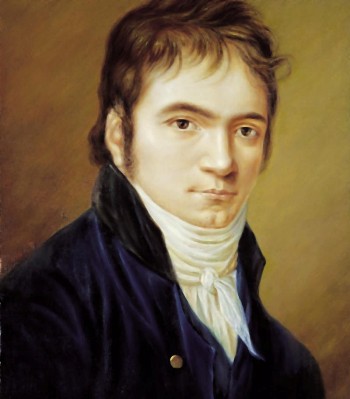
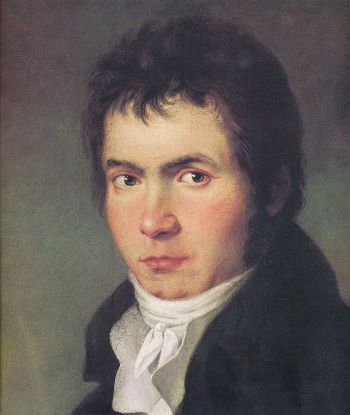
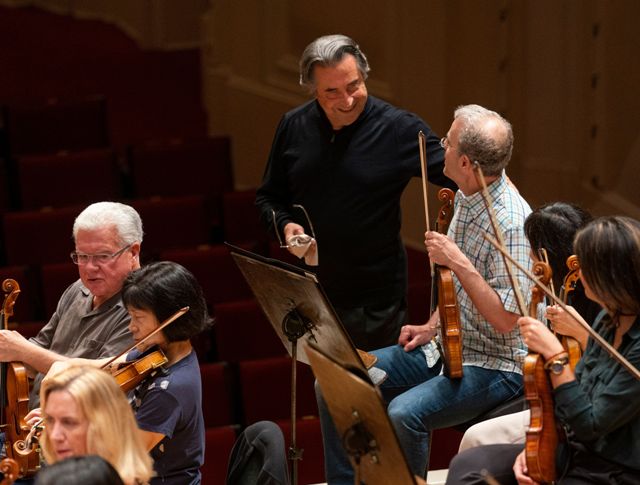
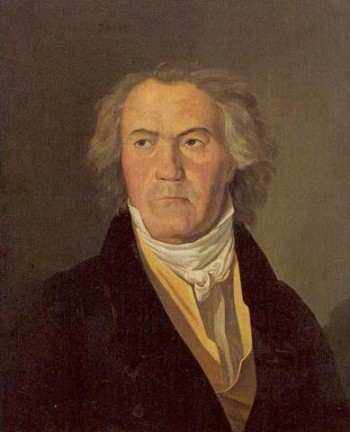
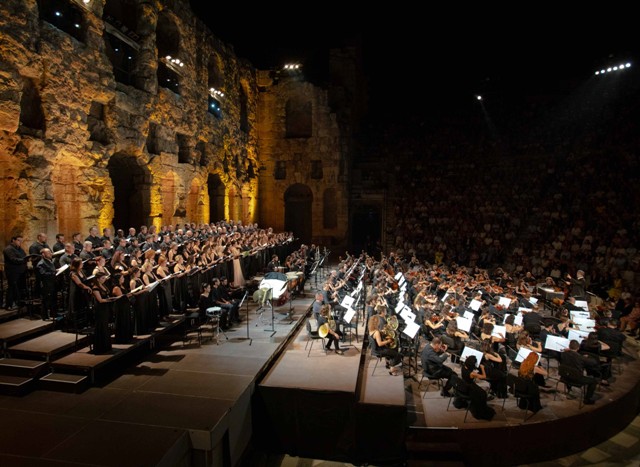

1 Pingbacks »